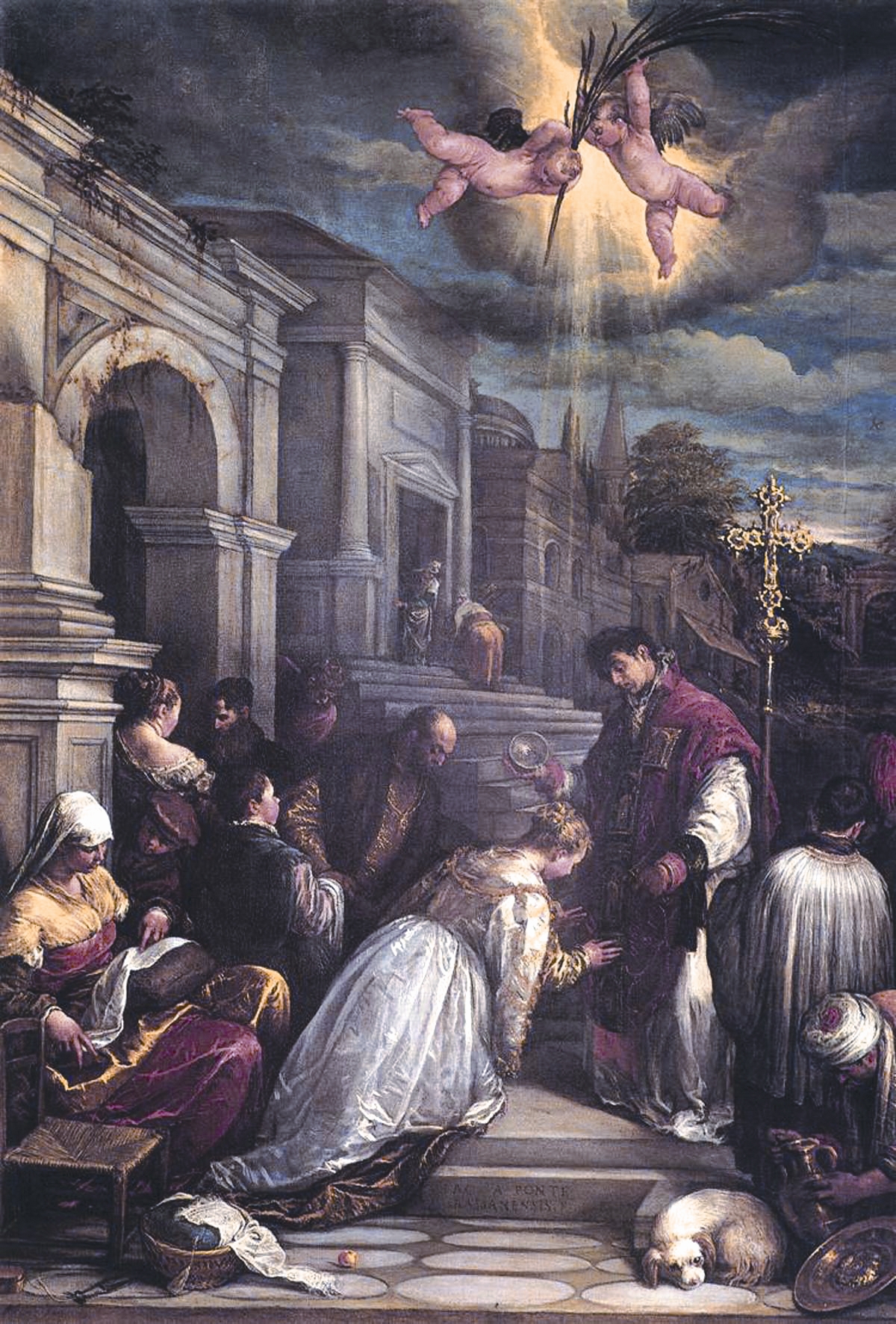January-February 2006
A Choice For Life

By Sister Ashwena C. Apao SSC
Sister Ashwena or ‘Winnie’ returned to Myanmar in September. You can find out more about her and the Columban Sisters at www.columbansisters.org
On 15 August I made my Final Profession as a Columban Sister in Jimenez, my home town in Misamis Occidental. My mother still lives there, my father having died nearly 14, years ago. I am one of five and from early in my life was active in the parish which was run before by the Columbans. My dad was a lay minister and my mother's faith very deep and strong. Their commitment to God and to others helped to cultivate and deepen my faith. As a young person I was involved in the Basic Ecclesial Communities, which stressed the empowerment of the laity. This helped to enlarge my vision of Church and deepen my missionary zeal.
Mission in Myanmar

My next assignment was to our motherhouse in Ireland where I spent about eight months. Then I was invited to be part of a group of Columban Sisters going to Myanmar (formerly Burma) to reopen a mission from which the Sisters had been expelled in 1966. I left forMyanmar in March 2003 with four other Sisters: two Irish, a Korean and a Filipina.
We live and work in Myitkyina, in northern Myanmar, among the Kachin people. My work is with the young. I teach religion, do creative arts and work in human development activities. The lifestyle here is very simple. I’m still struggling with the language and with insertion into a new culture, but I like it here.

My most unforgettable day
I was very happy, however, that I could return to the Philippines and to my native place to make my Perpetual Vows before the people most dear to my heart: my mother, my two brothers, my sister, my nieces and nephews, my relatives and friends and the Columban Sisters, Fathers and Lay Missionaries. It was a day never to be forgotten and a celebration that drew together the various strands of my life into a fitting offering to God. A Subanen flute and gong were played during the Entrance Procession and two Subanen dancers led us to the sanctuary. At the Offertory there were symbols offered: flowers, soil, a cross, candles, a Bible, a Kachin cloth from Myanmar, all accompanied by traditional Kachin Manau music. A variety of languages was used during the liturgy: Visayan, my native language; Tagalog; Subanen, the language of the people with whom I first worked after Profession; Kachin, the language of the people of Myanmar with whom I now live and work, and English.
You chose me
For my motto, I took John 15:16: ‘I chose you.’ After formally signing my vow statement I sang a special song inspired by those words, in my own language, ‘Gipili Mo Ako.’
Before the Mass ended, I thanked everyone who had come to celebrate with me and make it such a joyful and happy event. Then, with their hands extended over me in prayer, the Columban Sisters, together with all those present, blessed me and sent me forth. After the Mass everyone gathered to share food and friendship.
Before going to bed that night I reflected back on this most important day in my life. I felt overwhelmed at being so blessed. In my journey through life as a Columban Sister, the only thing I can boast of is that I am loved by God, the One who has chosen me to share the Good News with other people, especially the poor and the marginalized. It is God's grace that sustains and inspires me to continue responding to my vocational call as that unfolds for me day by day.
Father Joeker

By Fr Joseph Panabang SVD
JACK FRUIT ATTACK
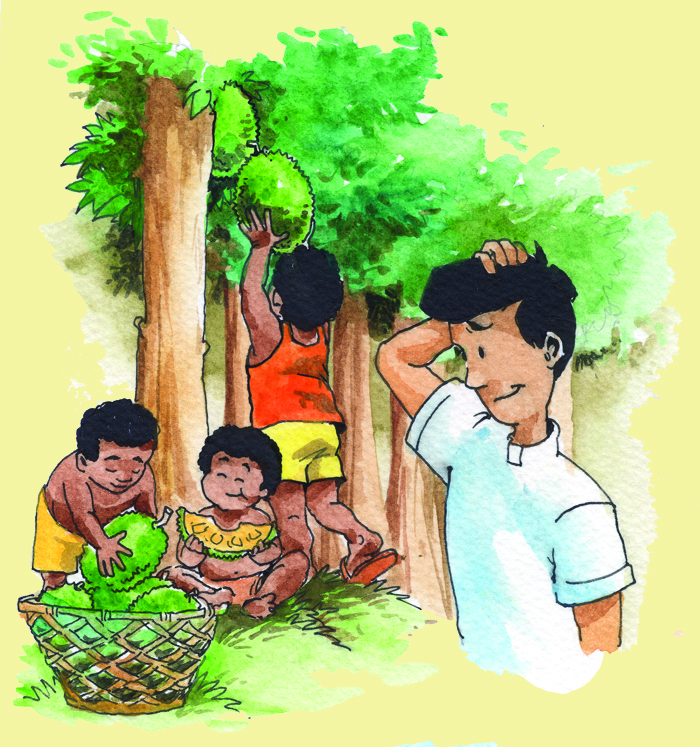
Before leaving Wenchi Vocational School, the Religious of the Blessed Virgin Mary (RVM) planted jack fruits in the compound. When I was transferred to Wenchi, I did not tell the people that the fruits were edible. We enjoyed the monopoly until accidentally the principal of the school, in my absence, saw it in the convent and was told by the cook how delicious the fruit was. Since then, hardly could I get one.
LOST IN A MAZE

Our Mother House in Steyl is so big, with so many corridors. Almost all visitors who go there for the first time get lost. Even I, wasn’t spared. One time, I spent 15 minutes looking for my room – that was already my second week in the house.
NEW NAME

In our group, I was the skinniest. Because of this, they baptized me with a new name: Joe “Cadaver” SVD.
No more angels
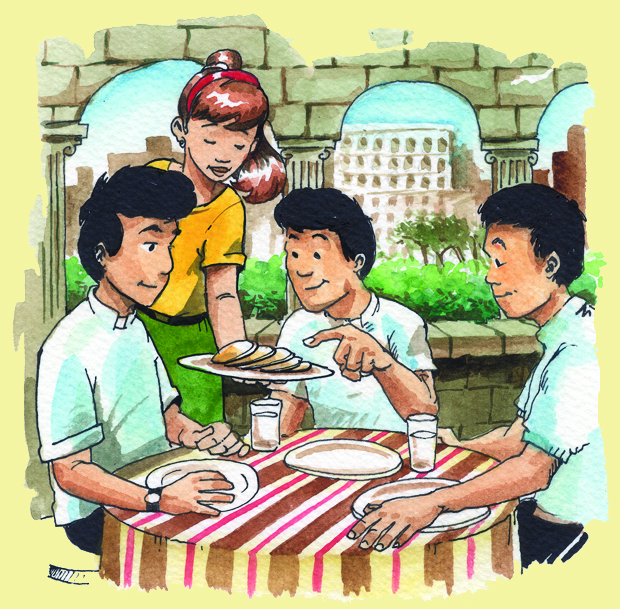
In Rome, our generous and kind Filipino confrere, Fr Miguel Yasis SVD, treated me and his priest relative to a restaurant. As appetizer, we were given crispy bread as thin as paper and which looked like wings of angel. I asked the waitress what it was and she said, ‘Carta di musica.’ But I insisted it was ‘Angel’s wings. No wonder why there are no more angels in Rome,’ I teased the waitress.
Filipino Novice Slain In Jamaica
By Father Seán Coyle

Mauricio Laspuna (3rd left) and his wife, Conrada hold hands as they remember their son, Marco Laspuna (at right in photo on altar) yesterday at Missionaries of the Poor's Corpus Christi complex at3 North Street, downtown Kingston. The Laspunas, along with another son, Douglas (2nd left) arrived in the island this week for Brother Marco's funeral tomorrow. With the family are Father Ambrose (left), a senior priest of the Missionaries of the Poor; Father Fidelis Stoeckl (2nd right), who serves as a missionary in The Philippines; and Father Richard HoLung, founder/leader of the Missionaries of the Poor. (Photo: Karl McLarty)
Brother Marco Laspul1a, 31, from Botolan, Zambales, and Brother Suresh Barwa, 22, an Indian, both novices of the Missionaries of the Poor, were buried in Kingston, Jamaica, on 12 November. The two had been shot dead in the home of the congregation in Kingston on the night of 27 October while washing dishes with their companions. A bullet killed Brother Suresh instantly and then wounded Brother Marco, who died four hours later.
The funeral Mass was celebrated in Holy Trinity Cathedral. This was followed by a procession through the nearby streets before a private burial in the presence of members of the congregation, Brother Marco's parents, Mauricio and Conrada, and his brother Douglas. Sadly, the family of Brother Suresh were unable to travel from India due to bureaucratic difficulties, though two priests from his parish were there.
Father Richard Ho Lung founded the Missionaries of the Poor in Kingston in 1981. They are a 'monastic order of Brothers dedicated to Joyful Service with Christ on the Cross to serve the poorest of the poor' (http://www.missionariesofthepoor.org/). They now have more than 180 members, priests and brothers. Archbishop Leonardo Z. Legaspi OP of Caceres invited the community to Naga City in June 1992. In February 2004 the congregation opened a mission in Cebu City under Brother Rodel Tabanao and Brother Augusto Silot Jr, both Filipinos.
Brother Marco was associated with the Canons Regular of the Holy Cross in St Raphael
Priory, Candelaria, Zambales, for some years and worked as a catechist. He then joined the Missionaries of the Poor and spent two years in Naga before leaving for his novitiate in Jamaica on 29 September 2003, the feast of Sts Michael, Gabriel and Raphael.
At a Mass in Kingston on 30 October Father Ambrose, a senior member of the congregation, said 'The gift that God has given us is greater than any other gift, the gift of martyrdom. It was not any of the high officials, but two young novices that God chose to bestow this gift upon, and I am also happy for that.
From Your Valentine
This is taken from www.carmelites.ie , the website of the Irish Province of the Order of Carmelites (OCarm)
The Roman Martyrology commemorates two martyrs named Valentine (or Valentinus) on 14 February, which seems to indicate that both were beheaded on the Flaminian Way, one at Rome the other at Terni, about 100 kilometers from Rome. Valentine of Rome was a priest who is said to have died about 269 during the persecution of Claudius the Goth (or Claudius II Gothicus). The other Valentine was allegedly Bishop of Terni, and his death is attested to in the Martyrology of St Jerome. Whether there were actually one or two Valentines is disputed. One possibility is that two cults – one based in Rome, the other in Terni – may have sprung up to the same martyr but that in the mists of time his true identity became confused.
In ancient Rome, 14 February was a holiday to honor Juno - the Queen of the Roman gods and goddesses. The Romans also knew her as the goddess of women and marriage. The following day, 15 February, began the Feast of Lupercalia. At the time the lives of young boys and girls were strictly separate. However, one of the customs of the young people was name drawing. On the eve of the festival of Lupercalia the names of Roman girls were written on slips of paper and placed into jars. Each young man would draw a girl’s name from the jar and they would then be partners for the duration of the festival. Sometimes the pairing of the children lasted an entire year, and often, they would fall in love and later marry.
Because he disobeyed the law
Under the rule of Emperor Claudius II, Rome was involved in many bloody and unpopular campaigns. Claudius the Cruel was having a difficult time getting soldiers to join his military leagues. He believed that the reason was that Roman men did not want to leave their loves or families. As a result, Claudius cancelled all marriages and engagements in Rome. Claudius also ordered all Romans to worship the state religion’s idols, and he made it a crime punishable by death to associate with Christians. But Valentine was dedicated to the ideals of Christ, and not even the threat of death could keep him from practicing his beliefs. Valentine and Saint Marius aided the Christian martyrs and secretly married couples, and for this kind deed Valentine was apprehended and dragged before the Prefect of Rome, who condemned him to be beaten to death with clubs and to have his head cut off. He suffered martyrdom on 14 February, in either 269 or 270.
One blind girl
This is one legend surrounding Valentine’s martyrdom. The second is that during the last weeks of his life a remarkable thing happened. One day a jailer for the Emperor of Rome knocked at Valentine’s door clutching his blind daughter in his arms. He had learned of Valentine’s medical and spiritual healing abilities, and appealed to Valentine to treat his daughter’s blindness. She had been blind since birth. Valentine knew that her condition would be difficult to treat but he gave the man his word he would do his best. The little girl was examined, given an ointment for her eyes and a series of re-visits were scheduled.
Seeing that he was a man of learning, the jailer asked whether his daughter, Julia, might also be brought to Valentine for lessons. Julia was a pretty young girl with a quick mind. Valentine read stories of Rome’s history to her. He described the world of nature to her. He taught her arithmetic and told her about God. She saw the world through his eyes, trusted in his wisdom, and found comfort in his quiet strength.
They believed in him
One day she asked if God really existed and Valentine assured her that He did. She went on to tell him how she prayed morning and night that she might be able to see and Valentine told her that whatever happened would be God’s will and would be for the best. They sat and prayed together for a while.
Several weeks passed and the girl’s sight was not restored. Yet the man and his daughter never wavered in their faith and returned each week. Then one day, Valentine received a visit from the Roman soldiers who arrested him and who now destroyed his medicines and admonished him for his religious beliefs. When the little girl’s father learned of his arrest and imprisonment, he wanted to intervene but there was nothing he could do.
Note to Julia
On the eve of his death, Valentine wrote a last note to Julia - knowing his execution was imminent. Valentine asked the jailer for a paper, pen and ink. He quickly jotted a farewell note and handed it to the jailer to give to his blind daughter. He urged her to stay close to God, and he signed it ‘From Your Valentine.’ His sentence was carried out the next day, 14 February 269 AD, near a gate that was later named Porta Valentini (now Porta del Popolo) in his memory.
When the jailer went home, he was greeted by his little girl who opened the note and discovered a yellow crocus inside. The message said, ‘From your Valentine.’ As she looked down upon the crocus that spilled into her palm she saw brilliant colors for the first time in her life! Her sight had been restored.
The almond tree
Valentine was buried at what is now the Church of Praxedes in Rome, near the cemetery of St Hippolytus. It is said that Julia herself planted a pink-blossomed almond tree near his grave. Today, the almond tree remains a symbol of abiding love and friendship.
In 496 Pope Gelasius I named 14 February as Saint Valentine’s Day. On each St Valentine’s Day messages of affection, love and devotion are still exchanged around the world. This could be because of St Valentine’s work in marrying couples against the law, or because of the miracle worked for Julia and the message he left for her. Others believe that people in medieval times sent love notes during February because it was seen as the mating season of birds and that St Valentine’s feast falling in the middle of the month became the principle day for this.
Compiled from various sources including The New Catholic Encyclopaedia (New York: McGraw Hill. 1967), Butler’s Lives of the Fathers, Martyrs and other principal Saints, and from the Encyclopaedia Britannica (London. 1962).
Below is the Opening Prayer from the Mass of St Valentine. You can find all the prayers and readings for his feast at http://carmelites.ie/Prayer/valentineliturgy.htm . Though the feast of St Valentine is no longer on its General Calendar – 14 February is now the feast of Sts Cyril and Methodius – the Church still venerates him as a martyr who defended the sanctity of marriage. He was truly a model diocesan priest.
OPENING PRAYER
All powerful, ever living God,
You gave St Valentine the courage to witness to the
Gospel of Christ,
even to the point of giving his life for it.
By his prayers help us to endure all suffering for love of you
and to seek you with all our hearts,
for you alone are the source of life.
Grant this through our Lord Jesus Christ, your Son . . .
How To Peel Carrots And Win Hearts
By Rowena Dato Cuanico
Rowena ‘Weng’ Dato Cuanico, who has written in these pages before, is one of three lay missionaries from the Philippines currently in Fiji.
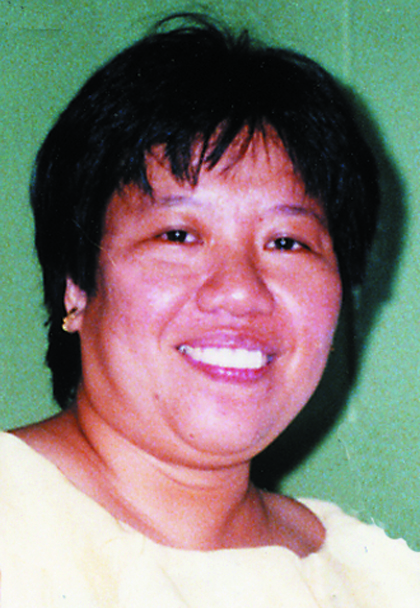
Rowena Dato Cuanico
After waiting for nearly eight months for our first mission assignment, I heaved a sigh of relief and excitement as the plane touched down at Nadi International Airport, Fiji, on 29 October 2000. ‘Lord, this is it,’ were the only words that I could muster and say to myself as everything that I wished, hoped and prayed for was finally becoming real. I hardly slept on the ten-hour flight from Seoul since during the night. I was awakened at least four times by the captain’s voice telling us to fasten our seatbelts because of turbulence. My drowsiness, fatigue and anxieties vanished quickly as I and five other lay missionaries from thePhilippines were greeted by the bright and glorious splendor of that Sunday morning and by the smiles of friendly faces. Perhaps, the big smile on Father Charlie Duster’s face and his warm handshake said it all in his Bula, Welcome to Fiji!
The first weeks
During those early weeks I hardly noticed day turn into night or night into day. I met many very warm and friendly people. In a short period of time I gained so many friends. I visited some of the parishes where Columbans serve and participated in the Columban Companions’ Day celebration. I found the experiences simply overwhelming and felt that all deserved to be written about. However, nothing beats the ‘peeling the onions and carrots’ experience
I remembered very well how the process of a missionary’s gradual insertion into the community was emphasized strongly during our formation program. Over and over, I would hear this friendly piece of advice: be sensitive to and respectful of the culture. While some people, particularly Columban friends, knew that we were coming, there was no messianic proclamation to announce our arrival! And so, during our first week in Fiji, the gradual insertion strategy was always at the back of my mind. It wasn’t until the second week that this was to be put into test.
Fijian funeral
Following the death of Columban Father Jim Rathbun, from New Zealand, on 12 November, and in accordance with Fijian tradition, the reguregu, a ceremony in which people pay their respects to the deceased, was held the day before the funeral. During the reguregu, the official mourning family of the Columbans, the parish and Father Jim’s family from New Zealand, were on hand to receive expressions of sympathy and condolences in the form of traditional Fijian gifts like mats and yaqona, the latter in the form of powder made from the root of a pepper tree and that is made into the ceremonial drink with the same name. A tent was put up between the church and the hall for the purpose along with a temporary kitchen beside the latter. Most of the men were in the tent while the women were in the hall, praying and singing hymns. We were with the women, introducing ourselves and expressing thanks to people who came to offer their sympathy.
Fun in the kitchen
We noticed that there were only a few people working in the kitchen. Yet it seemed that there was so much work to be done. Our offer to help was accepted gratefully. So, the six of us Filipino lay missionaries and Father Dave Kenneally, an Irish Columban visiting fromPakistan, went to work on the nearly 30 kgs of carrots and onions. A production line was installed with two peeling the onions, three peeling the carrots and two others slicing them. We maintained a high standard particularly with regard to the size of the carrot slices. Those that didn’t pass quality control were returned to the production line. I never imagined that peeling onions and carrots could be such fun and so enjoyable. Everybody seemed to be looking at us, obviously enjoying what they were seeing. We shared many jokes and funny stories. However, we also took the opportunity to share our own stories. Father Dave told of his missionary experiences in Pakistan and we shared our vocation stories. But to me, it was more than this.
Happy where I belong
For one, it gave me a great sense of belonging to the Columbans and to the community. I truly felt that I was part of the family, sharing its joys, pains, responsibilities and commitments. I was neither a guest nor a tourist, but one of them, sharing the pain of the Columbans and the parish because of Father Jim’s death. And by sharing in the work needed at that particular time, I also felt that I was a part of the community. I was able to seize the moment by simply being there.
Secondly, it made me realize that on a missionary journey, there are no big or small things, no great or lowly tasks. Everything matters - whether one is giving a homily, visiting a family, sharing a joke, learning a new Fijian or Indo-Fijian word and yes, peeling carrots and onions. This means that I could always be open to the prompting of the Spirit and willing to respond, joyfully and gratefully.
Joy in simple things
It also made me understand fully that mission is sharing. A missionary’s heart is one willing to share and to be shared. I realized that there was nothing extraordinary in what I did and shared, only a skill in peeling carrots and onions that I learned from my father when I was young. But what seemed to be an ordinary skill turned out to be a great gift on mission.
I never fully realized how peeling onions and carrots could touch the lives of people until the reception after the funeral. I was welcomed with smiles and hugs by the women in mourning and by the food committee. Some were telling people to eat the coleslaw because we peeled the carrots. Perhaps it became the biggest joke during the reception. It seemed that people remembered us for peeling the carrots and onions and for being with and one of them.
From this remarkable experience, I have been thinking that perhaps how to peel onions and carrots should be part of the formation program! Through this, the Fijians won my heart and I too won their hearts.
Into The Deep
By Sr Francesca M. Mariano FSP
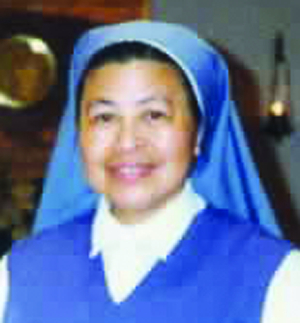
Then each one followed their own vocation. I entered the convent and at present I’m assigned here in Italy. Six remained in the Philippines and five went to the USA. And now our Lord is calling us back to Him one by one. Three in the Philippines have gone back to God and three in USA. Thanks be to God, we are still many.
My swimmer brothers
I recall when my three younger brothers were ten, eight and six and I thirteen. Though small, the boys were good swimmers, brave and clever. Unbelievably they could traverse the river, which ran through the middle of our farm, during a flood, even when the bridges were down. Two of them were observing the overflowing river, with logs coming down from the mountain. They told my father that they’d gather some logs. My father was against this because something bad might happen. But they went. They brought some rope, selected the log nearest the riverbank, tied it and brought the other end to my father. He had to pull while the boys guide the log towards the riverbank. They were able to gather good lumber, the length of an electric post.
That time I didn’t yet know how to swim. During the flood many people were watching the river, especially where bridges had been destroyed by the flood. I saw people trying to cross the river on bamboo rafts. Some had to go home to the barrio and some to the town for their needs. During summer the river was calm and the people could swim and wash clothes without fear. One of my brothers next to me, thought of teaching me to swim. Because someone drowned in it every year, it wasn’t easy for me to get permission to go swim in it. To get around this, and since many washed their clothes in the river during the summer, we came up with the idea that I needed to learn how to launder.
Swimming lesson
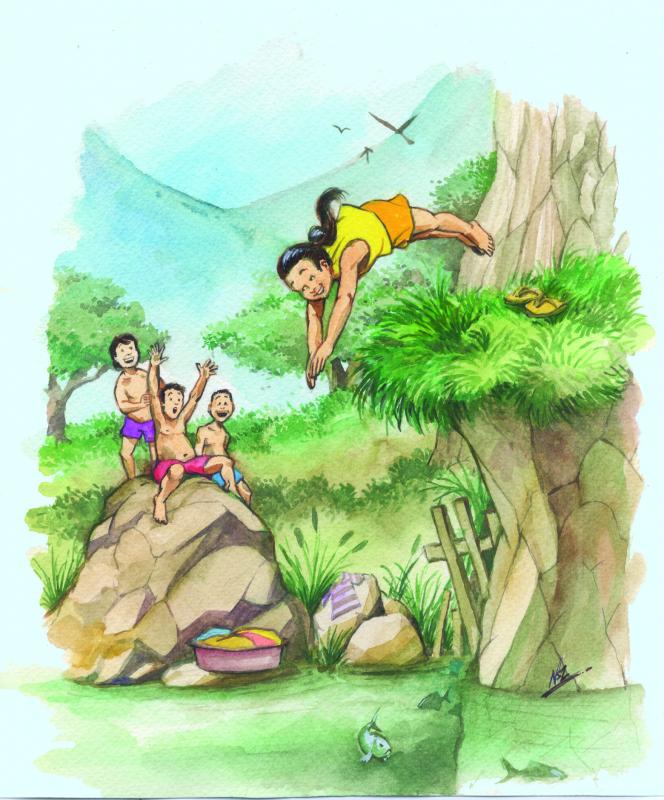
Each Saturday we were at the river to wash clothes. Just imagine, my three younger brothers had to help me to wash the clothes in order to have time to teach me to swim. We’d been doing this without the knowledge of our mother. Since I knew how to swim a little, they had to teach me how to save myself in case of danger in deep water. There was a construction made of logs on one of the riverbanks to prevent erosion. We climbed on it and the boys explained to me what we would do. I was to dive into a part of the river that was about five meters deep. I said, ‘What if I drown?’ They assured me, ‘No, we’ll rescue you. When you dive, we’ll watch you struggling because then you’ll really learn to swim. We’ll rescue you when we see you can’t go on anymore. We’ll swim under the water from behind you, and push you towards the shallow part and can swim away. So don’t grab us.’
I reflected, then agreed. Since I had never swum in deep water I was a little afraid, but I trusted them: they were good swimmers. Then we began the lesson. We repeated it many times until I’d learned. Thank God, it went smoothly.
The eldest of these three little boys later served in submarines in the US Navy, the second worked in the USA as a linotypist and the third a policeman in Manila.
Experience in Deep Water
After many years, I had an experience here in Italy. It was summer vacation and my superior told me to accompany a sister who was convalescing after a delicate operation. Our vacation house was only 50 meters from the sea, our own part of the beach fenced off. On Sunday I decided to go swimming after Mass. At ten o’ clock I began ‘riding over the waves’ and really enjoying myself. Then I began floating, lying down on the surface of the sea, my eyes closed.
Through the tides
At a certain moment I didn’t feel the waves anymore. I opened my eyes and looked around. Oh! My God! I’d carried out to the open sea. Then I looked towards the shore. The people looked as if they were only one foot tall. At once I tried to swim towards the seashore. But I encountered riptide, a strong surface current flowing out from the shore, something I’d read about in a pamphlet. I was continuously combating the waves in vain until I got tired. I stopped struggling and said to myself, ‘perhaps I’m going to die now.’ I tried to float to rest a while but was being carried away to the open sea. I tried to shout for help but the water was entering my mouth. I was very far from the shore and the roaring of the sea was louder than my voice. So I stopped struggling and looked up at the sky, and beyond the sky to heaven. I began my conversation with Jesus. ‘Jesus I’m tired. I can’t go on anymore. If you won’t help me I’m sure I’ll die. But if I die it won’t be bad at all. I’ll be happy knowing I’m coming to you.’
Then I felt my shoulder to see if I could still struggle for life. I continued, ‘Yes I know You will help me. Without your help I can’t go on. But remember, “minus one” of your workers in your vineyard.” Then I watched the movement of the sea and was inspired to ride on the top of waves. I could see from afar the waves returning back to the open sea and cried, ‘Lord Help me’ I dived deep down under the water to evade them. I repeated this until I felt the touch of the sand. I exclaimed, ‘Oh my God I’m safe. Thank you, Lord Jesus.’
Safe at last
I continued walking, the sand underneath reassuring me. When I reached the shore there were many many people, but nobody noticed that I had nearly drowned. When I reached our gate, I leaned on it, and with eyes closed murmured, "I have no words to express my gratittude, Lord. Thank you, my God, you have given me new life." I went down to the sea at ten, and with God's grace, returened home exactly at eleven. I struggled for life for more or less ne hour. The real gift of God that moment was that I didn't panic. Afraid? No. The next day I went swimming again.
From the writings of Sister Attila FSP
‘Let us keep reminding ourselves that alone we can do nothing, but with God we can do wonders, and all things. Our almighty God wants us to be close to Him. When we trust working with Him, what may seem impossible can become possible. Miracles have happened when all things seemed impossible.’
Learning To Be A Shepherd In Zimbabwe
By Father Ariel Tampus SVD

Father Ariel, from Cebu, was one of 14 ordained to the priesthood on 9 March in Divine Word Seminary, Tagaytay City, and is hoping to return soon to Zimbabwe. Ten of his group have been assigned on mission overseas. http://svdbotswana.home.pl/ , the website of the province of the Society of the Divine Word that includes Botswana, Zambia and Zimbabwe, has a longer version of his article. Father Ariel did his high school studies in Marigondon High School, Mactan, Cebu, and is a graduate of Cebu Normal University. He taught for three years in Michael Learning School, Talisay City, Cebu, before entering the seminary.
‘I am the Good Shepherd. The Good Shepherd lays down his life for the sheep’ (Jn10:11).Jesus’ parable of the Good Shepherd is one I can really relate to. Maybe it’s because shepherding is an everyday experience in Zimbabwe, a goat, sheep and cattle-raising country. Abelusi, shepherds, are everywhere, taking good care of the animals.
Student once again
I smile every time I remember my one-month stay in a village to practice the Ndebele language and to experience the life and culture of the people. I stayed with a very religious, simple family who treated me as a kin and made me feel at home. Every morning I joined the children in school. I spent a week with grade one pupils and a week with grade two. Then I went to grade four for two weeks, the first time ever I was ‘instantly promoted.’ This helped me to experience once again how a small child learns to speak. Learning a new language, in this case Ndebele, is fun but very humbling. Like a small child, I was very dependent on my elders and teachers. Even my grade one classmates were also my ‘elders’ and teachers.
Warmth of family
In the evening, after supper, our family usually gathered around the fire telling and listening to stories. We lived in a round hut where everything was arranged beautifully on the sides. African families are usually large and extended and have close ties. The fireplace in the middle warmed us during those windy and cold evenings, but the laughter around it made us even warmer. I loved it when we exchanged tales from our grandmother's story book down to the present happenings of the children in school. Our mother always led us in prayer before eating and before we slept. Our evening family activities seemed ordinary but were truly expressions of love and care.
Shepherding in the village
A new and interesting experience while with the family was learning how to shepherd the goats and cattle. Every afternoon I volunteered to join the boys in looking for the goats and leading them back to the kraal. (This word can mean either a rural village of round huts, surrounded by a stockade, or an enclosure for livestock). Like any ten-year-old boys, they teased one another and had fights on the way. But I learned how well they knew their goats. The village’s wide range of bush belonged to all, so the livestock of the entire neighborhood roamed everywhere. Looking for our twenty goats among hundreds wasn’t easy. But for the boys there was no problem. ‘Is that our goat?’ was my question every time I saw one. They always answered with a smile, ‘Asiyo!’ ‘It's not the one!’ Even from afar, they could recognize them easily and the goats recognized their voices as well. I didn't know if I’d ever learn this trade, maybe after long experience.
OTP in Zimbabwe
This was all part of the two-year Overseas Training Program (OTP) of the Society of the Divine Word (SVD) that enables seminarians to experience missionary life outside their country of origin. Through OTP I realized my dream, in which my vocation was deeply rooted, of being among our African brothers and sisters in Zimbabwe, in southern Africa. A central aspect of OTP was orientation to the Ndebele culture. Others were training in various fields of missionary work and pastoral work in a bush mission of Ndolwane.
Orientation to the Ndebele Culture
Living in the village, I experienced the beauty of Ndebele culture. I found the people to be simple, shown in the way they lived, for example in their eating habits. We had only tea and bread for breakfast. For lunch and supper we ateisitshwala, made from maize, with a relish, usually a stew.
The people’s mode of dressing is also unique. They’re more concerned about practicality than style. I loved the colorful designs of the clothing that women bring when they visit other places, to cover themselves from dust when sitting on the ground.
Singing and dancing can never be separated from African culture. One characteristic of the Ndebele language is its repetitive patterns. By repeating one sentence the people can make a good tune accompanied by the magnificent beating of drums. Dancing follows automatically when they’re singing. The movement of hands and feet makes any gathering truly alive.
Proud with their culture
The parish church is the place where the message of inculturation sounds so clearly. In terms of liturgy: weddings, baptisms and funerals are unique. They made me think how far behind we Filipinos still are in terms of inculturation compared to the Ndebele people. They take pride in their culture, which made me ask myself, ‘Do I really know my culture? Do I take pride in it?’ I realized that I can’t fully understand and love another culture if I don't know and love my own.
OTP, living with an Ndebele family, rounding up their goats, was for me an experience of the Good Shepherd making me feel that He was really taking good care of me, knowing me very well, always calling and looking for me whenever I'm lost and leading me back to his sheepfold.
You may contact Father Ariel at ayheesvd@yahoo.com
INCULTURATION
Inculturation, according to Father Aylward Shorter MAfr means ‘the presentation and re-expression of the Gospel in forms and terms proper to a culture. This process results in the reinterpretation of both, without being unfaithful to either.’ He also defines it as ‘the creative and dynamic relationship between the Christian message and a culture or cultures (Shorter, 11).
You can find an interesting paper on inculturation by Father Shorter athttp://www.afrikaworld.net/afrel/shorter.htm . He’s a member of the Missionaries of Africa,http://www.africamission-mafr.org/ , sometimes known in thePhilippines as ‘Missionaries of Our Lady of Africa.’ They are popularly known as ‘The White Fathers’ from their habit, based on the dress of Arab men in Algeria, where they were founded in 1868. This habit is an example of inculturation, though the name ‘White Fathers’ is sometimes mistakenly believed to refer to the skin of its European members.
The Lord’s Prayer in Ndebele
(as spoken in Zimbabwe)
Baba wethu osezulwini,
kalidunyiswe ibizo lakho,
umbuso wakho kawuze,
intando yakho kayenziwe,
emhlabeni njengasezulwini.
Siphe lamhla ukudla kwethu kwensuku ngensuku.
Usithethelele izono zethu,
njengalokhu lathi sibathethelela abasonayo.
Ungasingenisi ekulingweni,
kodwa usikhulule ebubini.
Ameni.
Source: http://www.christusrex.org/www1/pater/JPN-ndebele.html
Letter From Tanzania
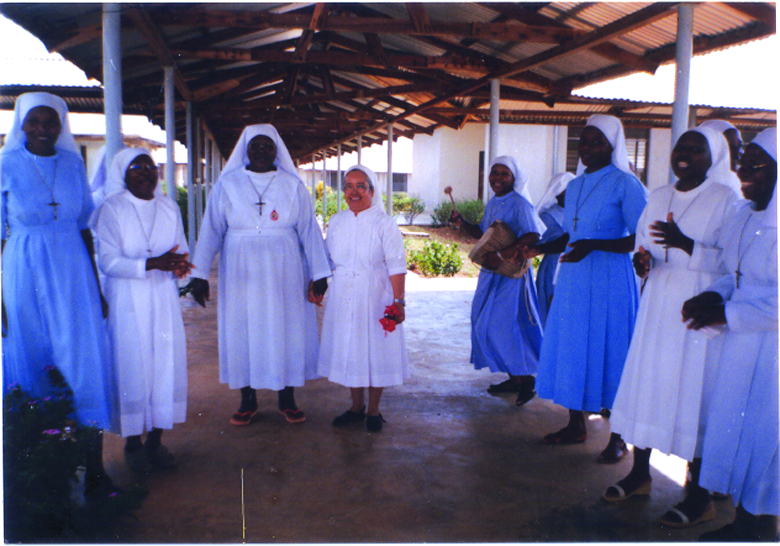
Sr Rosalie with Sisters at
Mtwara Secondary School for Sisters
Dear Father Seán,
Warmest greetings from Africa!
I’m trying to work double time making everything in order here and there for a smooth turnover to whoever will be taking over my work here as I go back to the Philippines for good. My role is really to stabilize the running of the Secondary School for Sisters, Mtwara, in southern Tanzania, and to train local people as much as possible who will continue running it. I can observe that they are gifted but need somebody to help them discover and develop their talents according to the task that will be delegated to them. They feel happy and very honored when entrusted with certain responsibilities, even without additional remuneration, which makes me feel so proud of them.
This school was established in 1994 by Bishop Gabriel Mmole of Mtwara, through the financial support of generous benefactors here and abroad, to help update the educational level of Sisters who haven’t completed secondary school and have been working already for some years in various parishes in Tanzania. It is hoped that by their completing at least high school, or even going for further studies if academically gifted, the quality of their service to the Church will be very much improved.
This school is right in the center of Mtwara town and is equipped with three complete laboratories, something found in very few other secondary schools here, thanks to our very generous donors! Our Sisters are indeed blessed to be studying in this well-equipped school with a quiet and beautiful atmosphere. They have every reason to exert great efforts in performing well in their studies through maximizing their use of all the facilities available.
Studying in the Secondary School for Sisters can be a real struggle, especially for Sisters who are older than the usual secondary school student. But they manage through great diligence and perseverance. They find time to study in-between personal work and assigned tasks in the school and manage to come together each day as a community according to their prayer schedule.
English is the medium of instruction in the school, so I communicate with them always in that language to enable them to have more practice in speaking it. All materials are in English except in the subject of Kiswahili, as they have to pass the National Examination in Form 2 and in Form 4, both given in English. The main reason why some fail is poor English, the greatest block in their studies. I’m sure if examinations were in Kiswahili nobody would ever fail. Whenever I tell the Sisters to do their best in them, they always answer, ‘We’ll try, Sister.’ And they really study so diligently, even late into the night.
Working in Africa teaches you many valuable traits. One good example is the ability of the people to respond quickly to the needs of others, even strangers. I experienced this several times when I just asked an African for directions. She didn’t only tell me but escorted me to the place, even though I could sense that she was in a hurry to go somewhere else. The Africans’ readiness to help you all the way is really something to ponder on.
I also admire very much their ability to listen, especially to a long homily at Mass on Sunday. Their listening is so intense, as if no one could ever disturb them. Of course, there are always negative aspects in a people’s culture, but picking those that are positive in another culture enriches your own. So as I leave behind my African mission, I bring with me all the precious gems I’ve picked along the way working with African people for six solid years, especially the Sisters at Mtwara Secondary School for Sisters. They will forever be part of my life’s history in which I’ve learned to be more patient, loving, understanding and especially attentive and accommodating to the needs of others and more so to love the dignity of work.
I hope that with this mission experience of mine will help inspire others to offer their generous service, especially to the African mission. I wish you and all your staff God’s abundant blessings!
Lovingly yours in Christ,
Sister Rosalie Mujar OSB

Kilimanjaro
The Swahili Language
Swahili, or Kiswahili, is the only language in Africa that can technically be classified as a true ‘lingua franca.’ Unlike most other African languages it’s a non-tribal language. Rather it’s more of an intra-national language of the eastern central and southern Africa. The language spreads from Tanzania, Kenya, Uganda, Rwanda, Burundi, eastern Zaire, northern Zaire, northern Malawi, northern Mozambique, northern Zambia to as far as Somalia. According to Kassim A. Abdullah (1996),although not as widely as in the above mentioned countries, Kiswahili is also used by some people in Congo, Southern Sudan, the Comoros Islands, Northern Malagasy Republic and the Persian Gulf states. It’s currently estimated that well over 100 million people use Swahili for communication. It’s an official language of Tanzania, Kenyaand Uganda. The language enjoys a unique position, particularly at primary and intermediate level education, where it is the official medium of instruction in some countries.
Adapted from http://www.unb.ca/web/civil/dccchair/dmm/swahili.html
The Lord’s Prayer in Swahili (http://incolor.inetnebr.com/stuart/lp_swa.htm)
Baba yetu uliye mbinguni: Jina lako litukuzwe. Ufalme wako ufike. Utakalo lifanyike dunianikama mbinguni. Utupe leo chakula chetu tunachohitaji. Utusamehe makosa yetu, kama nasi tunavyowasamehe waliotukosea. Usitutie katika majaribu, lakini utuokoe na yule Mwovu.
Ministry Among The Subanen
By Father Frank Hoare SSC
The author, from Ireland, is on the General Council of the Society of St Columban. He worked for many years in Fiji.
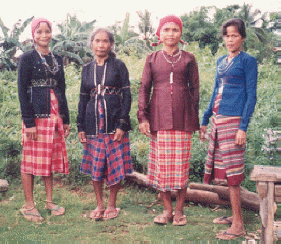
Subanen Women
When Columban Father Brendan Kelly, from Northern Ireland, arrived at Katipunan, a mountain village in Misamis Occidental, nine years ago, he was shocked by the lack of education and medical services. The Subanen people, the original but displaced owners of the land, lived in extreme poverty. As a missionary he wanted to help. But aware of the big development plans of well-financed NGOs in the area, he wondered at first if he had any role to play. He decided then to take a people-centered approach.
Insecure people
To overcome the understandable mistrust of outsiders that ran deep in the Subanen, Father Brendan decided to start by learning their language. That might not seem very radical. But the Subanen all understood and used the Visayan language and even denied that they used their own language, which some were refusing to teach their children. They were ashamed to be identified as Subanen and laughed at as backward, ignorant people.
The priest walked into the mountains and sat around in the villages. It was hard to break through the people’s suspicion. But he hung around all day and the natural hospitality and humanity of the people won out against this. They invited him to share their meager fare and to sleep in their huts. They came to know him and he came to know them personally. Knowledge of language and culture followed. Father Brendan was overjoyed one day when an old Subanen visitor, hearing him speaking Subanen, overcame his shyness and sat beside him to listen more intently to this great wonder.
Working through their deficiency
After gaining the trust of the people, Father Brendan decided on a strategy of community building and leadership training. He started the Katipunan Subanen Organic Farming Group. The members of this cooperative venture shared seeds and he helped by supplying forks and other implements. He helped organize the marketing of produce by identifying customers. These included the diocesan seminary and the Columban headquarters in Ozamiz City, about 30 minutes drive away. He offered to transport the organic bananas, sweet potatoes, Chinese cabbage, spring onions and other vegetables to the city on his weekly day off.
The missionary sent promising young men from different villages to do sustainable agricultural courses and they became the organizers of the cooperatives in their villages. The fine Formation Center built in 2003 became the venue for meetings, training and important social occasions as well as the collection point for the agriculture produce.
Oasis in the desert
Water was a major problem for some of the villages. Father Brendan assisted the Subanen community close to the church to install their water scheme. One sponsored by a private charitable foundation had a condition that the source of the water should be within four kilometers of the village. Namut village, the heartland of the Subanen in that area, could only find a source way up in the interior of the forest, seven kilometers away. The young Irishman was able to obtain the money needed to supplement the foundation’s assistance. It was a historic day for the people when they saw the water gushing out of a pipe in the middle of their village. They would no more have to trudge down and up steep mountains carrying buckets of water for hours every day. The women, who bear the brunt of the burden of washing clothes in the river in the ravine below, were especially delighted. One old man shed a silent tear of joy and disbelief at the flowing water they had so long dreamt of.
What the people really needed
Education is essential for development. The Columban missionary saw the importance of giving the children a head start before they ventured out of their village to the government elementary school dominated by the Visayan children. He discussed the building of a day care center in Belabag village with the community organizer, Tiboy, and the people. The community was enthusiastic. The priest would supply the materials and they would carry them from the road across the ravine to the village. They would also supply the site and labor force.
Father Kelly sent a promising young woman graduate, Langlang, to train as a day-care teacher. When the building was completed he employed her as such and as part-time office worker and bookkeeper for the farming projects. He also sent her to attend conferences on the legislation introduced by the Philippine government on the ancestral land rights of indigenous peoples such as the Subanen.
Teaching them by their language
The Subanen people in earlier times identified Christianity as the religion of the Visayan immigrants who took over their best ancestral land and pushed them back into the mountains. For them the symbols of Christianity were foreign and oppressive. A missionary such as Father Kelly, a Christian leader but clearly not Visayan, could help to change this inaccurate understanding of Christianity. All the more so when they heard him lead worship in their own language and saw him welcome their traditional rituals into Church proceedings. He sent Delma, a young Subanen woman, to train as a catechist. In her course she is encouraged to understand the message of Christ in terms of the history, culture and context of her own people.
Father Brendan sees his role not just as an advocate for the oppressed ethnic minority. He also recognizes the need for respect and reconciliation between the Visayan and Subanen peoples. So, though his main work is with the Subanen people, most of his sacramental ministry in Katipunan is for the Visayan people in their language. He also trains young lay Visayan leaders.
Subanen rights
Archbishop Jesus A. Dosado CM of Ozamiz recognizes the duty of the Church to affirm respect for Subanen rights. At the dawn of the new millennium in 2000 he drafted a formal apology from the Church for its part in the abuse of the Subanen people and had it inscribed on a stone at the entrance of the cathedral in Ozamiz City. The same apology greets the Subanen people as they enter the church in Katipunan.
The Subanen communities around Katipunan have now experienced the fruits of their cooperative efforts. They have a group of young enthusiastic leaders who are the hope for the future. Above all, however, the people have experienced a paradigm of development that is very different from and ultimately more powerful than the traditional political mechanisms of corruption and violence.
Our Hideaway
By Bernadette Pattugalan
The author is now in Fourth Year high school at St Scholastica’s College, Manila.

We had our class outreach in Pandacan, Manila, a squatters’ area where the houses are beside the railroad. I really didn’t know what to expect when we were going there. When we got off the jeepney, children came and greeted us.
They brought us on a tour around the place. While we were touring, a train was coming our direction. I felt its rush and roar, just a feet away from me. I realized at that moment the danger it could bring. I also asked myself, ‘Of all places, why build a house beside a railroad?’
Our class was divided into groups and brought to different houses. My group went to a house that looked like a compound. The family occupied three rooms while letting two for rent. We talked to a two-year-old boy and his aunt. They offered us Coke. I was touched by this because despite their circumstances they still bought something to offer us. I was surprised when I saw the parents of the child: they looked very young. After a while the boy’s aunt told us that her sister gave birth at the age of 16. I pitied them for their situation. The mom of the two-year-old didn’t seem know what to do with him. The parents also seemed to have stopped studying.
In that short span of time, my perspective changed. Our trip there showed me that people live in very different situations in the world. Before our visit, whenever I’d see squatters, I’d always say, ‘Why won’t they look for a job? Why do they have so many children whom they can’t support?’ Pandacan showed me that they have different personal reasons that I need to respect.
The Four Pontifical Missionary Societies
These four pontifical societies have been given the responsibility by the Pope (hence the name 'Pontifical') to support the preaching of the Gospel of Jesus Christ and the work of charity and social improvement around the world. They promote awareness, prayer, sacrifice and fundraising to support worldwide Catholic mission.In the Philippines, the National Director of the PMS is Msgr Gilbert A. Garcera who is also Executive Secretary of CBCP-ECM, the Episcopal Commission on Missions.

The PMS will be involved in the Asian Mission Congress in Changmai, Thailand, from 17 to 22 October. You can learn more about this at http://www.fabc.org/offices/oe/oe_congress.html
Society for the Propagation of the Faith (SPOF)
The Society was founded in Lyons, France, in 1822 by the Venerable Pauline Jaricot to promote missionary cooperation in every Christian community. Besides collecting funds, the Society promotes missionary vocations, education in missionary spirit, particularly during October, the Church’s ‘Mission Month.’
There’s an interesting article by Father Richard Leary CP, a missionary in Jamaica, online athttp://www.cptryon.org/compassion/sum97/leary.html on what inspired Pauline Jaricot to start the society.
Holy Childhood Association (HCA)
Based on the motto ‘Children Helping Children,’ the Society encourages a concern for children worldwide by prayer, learning activities and fund-raising. Over 150 years ago, Bishop Charles de Forbin-Janson of Nancy, France, the founder, asked children to say a short prayer each day and give a penny a month for suffering children.
Society of St Peter the Apostle (SPA)
Stephanie Bigard and her daughter Jeanne founded the Society in 1889 in Caen,France, to make it possible for the Church in mission territories to develop a local clergy through financial aid and prayer. The Society later extended its support to candidates, men and women, for the religious life.
Pontifical Missionary Union (PMU)
Blessed Paolo Manna (http://www.catholicmission.org/Blessed_Paolo_Manna.html) founded the Union in Italy in 1916. It aims to increase missionary awareness among priests, religious and lay people and to unite in spirit and prayer all persons called and committed to ministry in the Church.
You can learn more about these societies online athttp://www.missionsocieties.org.uk/, a website of the Church in England and Wales, where the HCA is sometimes called ‘Mission Together.’ The site has links to many in-depth articles on mission.
Tithing, A Way Of Life
By Father Rembert G. Rivera
The author is Chairman of the Commission on Mission in the Diocese of Kabankalan, Negros Occidental.
 In 1990, in my first assignment, as parish priest of St Isidore the Farmer Parish, Moises Padilla, I had a dream of serving my people zealously in the Diocese of Kabankalan. I worked hard in building Basic Ecclesial Communities (BECs), the foremost program of our diocese under Most Rev. Vicente M. Navarra, now Bishop of Bacolod.
In 1990, in my first assignment, as parish priest of St Isidore the Farmer Parish, Moises Padilla, I had a dream of serving my people zealously in the Diocese of Kabankalan. I worked hard in building Basic Ecclesial Communities (BECs), the foremost program of our diocese under Most Rev. Vicente M. Navarra, now Bishop of Bacolod.
I read an article in Misyon, when the late Fr Niall O’Brien was editor, about the ongoing tithing program in the Diocese of San Carlos, under Bishop Nicholas Mondejar. Without much ado, I wrote Bishop Mondejar and later met him at the Bishop’s House in Bacolod. He refused payment for the five copies of the handbook of theModified Training Program and Self-sufficiency Program that he gave me. But he asked me to spread the idea among my fellow priests and lay people.
Study and implementation
After reading the handbook carefully, I understood that tithing is love without counting the cost of sharing. You must learn to use your talents, use your money wisely and give ten percent to the Lord or just give until it hurts.
I organized a group of lay people as ‘Street Workers,’ with a Tithing Coordinator and Zone Coordinator to make the work more easy and efficient. I implemented the theory of starting small, with P5.00 a week or a total of P20.00 or P25.00 a month. The strategy of Bishop Nicholas Mondejar really works because the people in the BECs are aware that giving to the Church is always synonymous with loving the Lord with your whole mind and heart.
Pitfalls
In my experience, tithing, to be strong and relevant to the people, needs a vigorous prayer life – asking the Lord to enlighten you about material comforts. Sometimes if your stomach is full you don’t find time to pray or see the beauty of nature. The priest, coordinator, street workers, parish fiscal and finance council have a big role to play. Transparency and hard work by the priest for the people, organizing and evaluating the strategy and implementation of the program, are also necessary.
Sometimes priests find the program tiresome, taking from their time for rest and recreation. So tithing can die due to human frailty.
Success
I honestly believe that successful tithing lets the people know why they share their money with the Church. If they see that the church is beautiful, clean, with an ambience that calls you to pray and the priest always welcoming, they will always share, giving and opening their hearts to the needs of the local Church.
In my ten years of promoting tithing, I’ve constantly told the people to try it and to see the goodness of the Lord, reminding them that ‘God loves a cheerful giver’ (2 Cor 9:7) and to ‘Seek first the Kingdom of God and everything will be given unto you’ (Mt 6:33).
I welcome you dear readers to write or email me so that you can receive modified tithing brochures plus simple self-made modules on tithing. Try it!
Two Stories From China
By Tina
What do you say before eating?’

‘What can I say before eating? I know that you say something. What about me? I don't have anybody to pray to. Could I just say “thank you” to my mom and dad?’
A twenty-year-old student of mine and I were having lunch together when he asked me this. I couldn’t answer well for we were in a restaurant where quite a few foreigners were eating too. I was surprised and at the same time paranoid in answering such a simple yet striking question. This young man tested my beliefs in a way he couldn't imagine.
In China, we can’t to be so open expressing our faith. That makes it quite awkward for a Catholic like me to make the sign of the cross before a meal or even call a clerical colleague by his proper title. This can be hard to adjust to at first. So before eating I’d rather say a short prayer silently and skip the sign of the cross. This can be difficult at the beginning but you eventually get used to doing your Catholic practices in a subtle way.
So I answered, ‘Yes, I think you can say “thanks” to your mom and your dad for giving you the money for the food you are about to have, and wish that they too may eat the same kind of food.’ He then asked, ‘What could I really say if I was like you? Could I possibly hear it?’ And so I uttered, ‘We usually say, “Bless us, o Lord, and this food we are about to eat. Bless those who prepared it and those who are not having the same kind of decent meal we have now. Amen.”’
I hoped that I explained the matter well and let him know what he wanted to know. I hope that, more than the words he heard from me, he saw something good in that practice that will make him think that I am a good person. Sometimes I ask myself if I’m still making sense with my life in China. Am I capable of changing the ideas and opinions about life of others by my own way of living? These questions can bother me. I’ve been here four years and the students never cease to amaze me. It's so strange how simple questions from them can rock my spiritual peace. I almost forgot to pray that day in the restaurant until the young man’s question reminded me that I needed to do so before I bit into that juicy, expensive burger.
Of Chopsticks and Students Choosing Teachers.
‘Teacher can you take my photo? It's my first time to eat with spoon and fork and not with chopsticks.’ So I did as requested. This is just one clear picture of the simplicity of the Chinese students I’ve met for the last four years.
I took a photograph of each class I had at the start of this semester. The Foreign Language College, where I’m one of ten foreign faculty members, has created a new scheme to motivate students to study. Now they can choose the teachers they like to have. It’s quite rewarding for the teachers but can be a bit complicated in the end.
I have 43 students in my biggest class and 21 in my smallest. I complained because I thought that with the ‘choose whom you like system,’ the administrators should have come up with a ceiling number per class for efficiency. A Spoken English class with a large number is less effective. Thus, I needed to take a photograph of each student to put the right name on the right face. This can be difficult, especially when you get two Helens, three Maggies or four Cindys in a class among others with popular English names.
I succeeded in dividing my classes, which was difficult as students had different schedules and it was impossible to find the best time for each. Teachers had to find their own way to release the tension that could otherwise affect the teaching-learning process. I ended up having 28 or 29 students in each section, still a big number but a great relief from 42 or 43.
There are so many other simple stories of China and my students, so many things in my mind and in my heart that I’ll never stop sharing with my friends. Maybe I’ll write them all when my hair starts to become gray, my spectacles are thicker, and when I’ll need to spend more time alone because I’ll have all the time in the world just for myself.
Wüst Family From Germany
Dear Father Seán,
In our church community we say: ‘Guests are a blessing from God!’ We were very happy when we heard that two young people from the Philippines would stay in our house for five days. Our children Jasmin and Elisa had their school holidays and my wife and I took ours also. One of us went to every event of the ‘Days of Encounter at Limburg,’ with our ‘foster daughters’ from the Philippines. At all these events we felt the Spirit of God. It was wonderful! Together we sang spiritual songs, talked and prayed to God. There was a great feeling of peace and harmony. We all felt as brothers and sisters. It was really wonderful.
The first evening the Filipino girls were here our daughter Elisa played ‘Monopoly’ with them. It was an evening of fun. We went to bed very late. The nicknames of our two visitors were ‘Tin Tin’ and ‘Joy.’ Every day there was a different other and at each we had this deep feeling of peace and harmony in the depths of our hearts. Those five ‘Days of Encounter at Limburg’ were for us a wonderful time. We will really miss this time of happiness and peace. We can truly say: ‘Our guests were a blessing from God!’
Sincerely yours,
Wüst Family from Germany
Your Turn
A student from St Scholastica shares how a short item from Peace by Peace inspired and encouraged her in her own involvement in their school’s outreach program.

Dear Father Seán,
You really have a lot of engaging and inspiring articles in your magazine. One short item that struck me was a quote by Blessed Mother Teresa in your Peace by Peace section, July-August 2005 issue. It said:
If you really belong to the work that has been entrusted to you, then you must do it with your whole heart and you can bring salvation only by being honest and by really working with God. It is not how much we are doing but how much love, how much honesty, how much faith is put into doing it. It makes no difference what we are doing. What you are doing, I cannot do, and what I am doing, you cannot do. Only sometimes we forget and spend more time looking at somebody else and wishing we were doing something else. We waste our time thinking of tomorrow and today we let the day pass and yesterday is gone.
This paragraph really struck me because I can associate it with my involvement in our outreach program in our school. I admit that during my first year, I considered it as an obligation because the outreach representative of our class was my close friend and I also wanted to have a high grade in our Homeroom. Later on, I began to participate in almost all of the outreach activities and that was when I realized that I no longer saw the outreach as an obligation but as an activity that I always look forward to and most especially, as a fulfillment. I am able to experience God when I am at Pandacan, Manila, where we have our outreach. There, I teach little children their Math and ABCs. Though it is very exhausting, I am able to enjoy and experience happiness.
Now that I am part of the High School Outreach Core, I know that the outreach is really a part of me. It is where I am given a chance to see the other side of life. Most importantly, the outreach was where I realized that while I am having trouble looking for the best outfit to wear or complaining about the food that I don’t want to eat, there are other people out there worrying about where they would get money food or how to pay their bills. It really is an eye opener and life changing. I don’t regret that I miss out on a lot of gimmicks and parties with my friends because the opportunity to serve the less fortunate is rare. I have learned the deeper meaning of happiness and fulfillment, that this can be achieved not by experiencing fun and pleasure but by giving one’s self, including your time, talent and resources to make others happy.
Thank you very much and God Bless!
Sincerely yours,
Melissa Andrea M. Kahayon
St Scholastica’s College Manila
‘Be Still And Know That I Am God’
By Crisaldo A. Belas
Crisaldo Belas is Formation and Training Assistant of the Pontifical Missionary Societies of the Philippines. The PMS of the Philippines is not a religious congregation, nor an institute of consecrated life. It is under the Congregation for the Evangelization of Peoples.
As a professional catechist of the Archdiocese of Manila from 1996 till 2004, I attended monthly catechetical formation sessions in our area. We usually recited Morning Prayer from the Liturgy of the Hours, the official Prayer of the Church, and spent time in silent prayer. Those years of formation awakened in me an understanding and love of prayer.
Working at the National Office
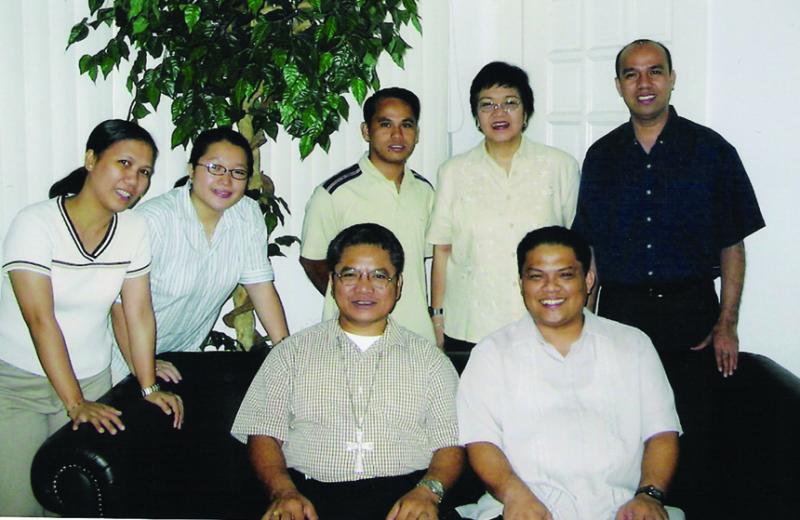
Front row: Bishop De la Peña of Marawi and Msgr Garcera; Back row: Cris (Far Right) with PMS Staff
Trusting in God’s providence, I ventured to look for other avenues of life and was accepted at the National Office of the Pontifical Missionary Societies in Sampaloc, Manila. I discovered that office hours started at 7am when we tidy our desks, a daily reminder of the importance of good office keeping.
First schedule of the Day
Monsignor Gilbert A. Garcera, the National Director of the Pontifical Office, introduced to all the staff, including household workers, the value of silent prayer as one family before the exposed Blessed Sacrament as the first activity of the day. At first, I found silence really difficult and thought it impossible in the midst of the noise of Sampaloc. I spent months trying to pray silently. Many times I failed. Then I realized that learning to pray is not by trying to pray, but by giving up and letting go of my ‘trying.’ The real silence is interior. Monsignor Gilbert taught us that we learn to pray by being attentive. This means bringing my center to the full consciousness of my being a person. It brings me from past experiences and future plans into the present, which is restful and gentle. In my prayer, I love to share with Jesus not my ideas, nor plans, nor anxieties about the future, but my stillness and attention to His presence. ‘Be still and know that I am God’ (Psalm 46:10).
Working at the National Office has made me discover the importance of sharing silence with my co-workers. Oftentimes I’m distracted during prayer. I remember a Buddhist saying that the mind has 151 operations going on at the same time. There are desires, dreams and great expectations that sometimes can divide and dominate us. But I have to be conscious of all these and let go of them. Then, I go back again to being attentive to His presence.
Fruits of Silent Prayer and Missioning
Yes, there are challenges that come my way as a young adult, but God has never abandoned me in times of trial. I’ve noticed that the fruit of prayer is my being open to active interaction with my fellow employees. This spirit of opening also gives me the strength to work for the Church, thinking not only of the Philippines but of the universal Church.
I’ve realized that there can be no missioning without prayer and consider this realization a grace of God’s providential love for me. I believe that I encounter Christ not only in my work but in people around me.
I invite you to visit us and share the prayer of the heart. In prayer we accept that God knows our needs and that this knowledge is the love which creates and will eventually complete our missionary work.
‘We Went To Follow The Star’
By Ma. Kristina Garraton Abella
The author is a college student at the University of St LaSalle, Bacolod City.
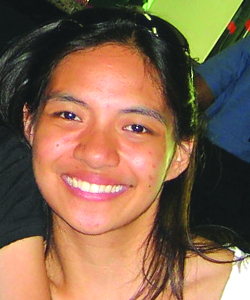
World Youth Day (WYD) is a pilgrimage of young people and a festival of encounter and solidarity. Young people from all over the world are invited to take up the main concern of the late Holy Father, Pope John Paul II: a renewal of evangelization that reaches out to the young. This enables the youth to experience a deeper sense of spirituality and community. I am grateful and happy that our new Holy Father, Benedict XVI has continued this tradition and came to meet us in Cologne.
‘We have come to worship Him’ was our theme. I was privileged to be one of the delegates from the Diocese of Bacolod, given the opportunity to discover the ‘young and modern mystery of the Church’ through the experience of pilgrimage, prayer, and worship.
A Change in Perspective
It was almost 7am when we landed at Frankfurt. Oli, a German organizer, welcomed us. He guided us from the airport to the train station and even rode with us on the train, which was to drop us at Lindenholzhausen, a town in the Diocese of Limburg where we were to be housed during the Days of Encounter. I was amazed by the gestures of this German friend. I thought that Germans were strict and dictatorial but this person before me was really helpful and accommodating. He even helped us carry our large pieces of luggage up and down the stairs.
Welcomed in Germany
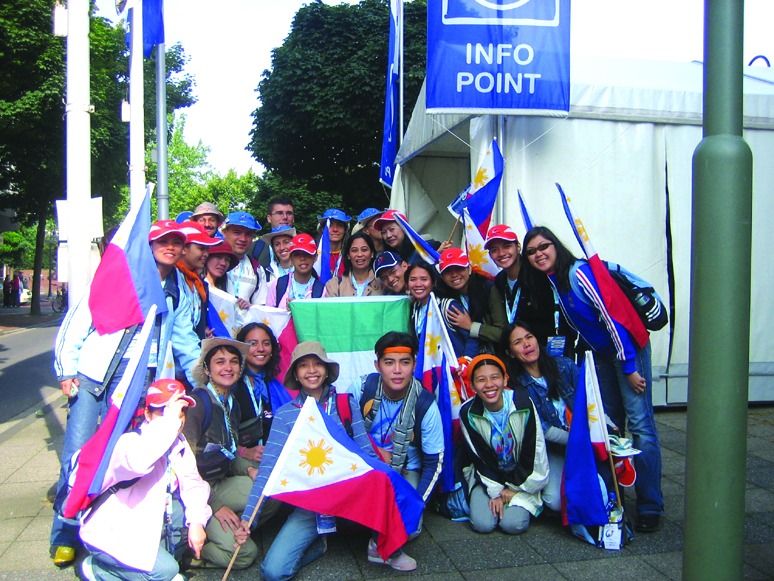
Arriving at Lindenholzhausen, we saw that the families who were to house us were already awaiting our arrival, despite the cold temperature. Each delegate was housed by a specific family. I was assigned, together with my friend Joy, to the Wüst family. I’m really proud that they were my foster family. Helmut, the father, and Marge, the mother, greeted us with warm smiles that made me feel at ease and welcomed. We introduced ourselves to one another. I was surprised and a bit shy when they carried our large, heavy luggage from the station to their car and even to our room when we reached their house.
There we were greeted at the doorstep by their two daughters, Yasmine (18) and Eliza (16). The family had given us our own room with toilet, and a living room for us to use, on the second floor. Then they served us breakfast and told us to feel free to eat any food and fruit on the table any time we felt hungry. I, a stranger, was really moved by their hospitality that made me feel welcomed and accepted as a new member of their family.
Days of Encounter
We stayed at Limburg, south of Cologne, for five days, each memorable. I went canoeing for the first time ever. It was exhausting but quite an experience. We even had a beach party afterwards where we played volleyball – Germany vs Philippines. Amazingly, we won the game, with rice as our prize! An event to remember! In Germany, their usual fare is bread and sausages, which really taste and smell good. But we Filipinos hadn’t seen, smelt or tasted rice for several days and missed it. This became our motivation to win.
Within the Days of Encounter at Limburg, we had a ‘Day of Social Service,’ the motto of which was: ‘Under construction – help build a just world!’ This was inspired by the call of Pope John Paul II: ‘Become builders of a civilization of love and truth.’ Activities included social projects like renovating community premises, improving a children’s playground and collecting old clothes. I, together with young Filipino, African and German friends, was assigned to collecting old clothes and unused things around the village. I saw the willingness of the people there to participate.
In these activities, I recognized the diversity and richness of the Church’s youth work and Church life in the diocese. But I came to understand that despite this diversity, we all worship the same God, and all our efforts and goals are directed towards serving Him.
WYD Proper
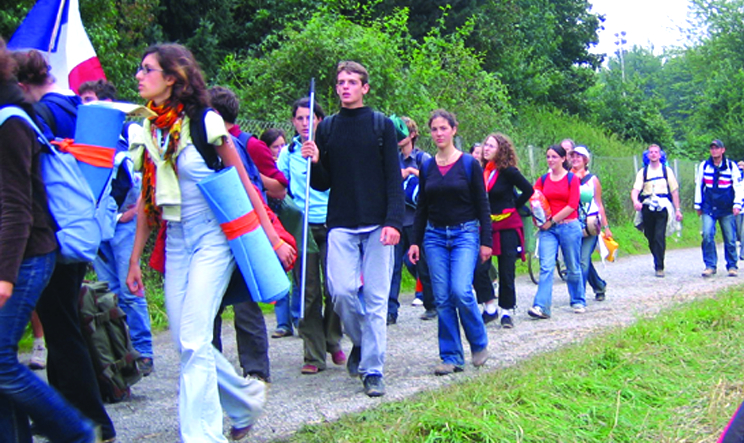
I had come to World Youth Day for the purpose of searching myself and the core of my life, which is Christ. I had wanted to fill the emptiness inside me and to find direction in my life. I knew Christ had the answers through World Youth Day. In the process, I had come to see that the way to God is no bed of roses. One really needs to pass through thorns and overcome many hardships and temptations to be at His side. But I had also proven that God had always been with me all throughout my journey.
Seeing the Pope for the first time
Our journey in search of Christ began at Neuss, northwest of Cologne. We stayed at a gym in a school there with other youth pilgrims from different countries. The high point of our journey was seeing the Pope for the first time on the River Rhine. I didn’t care that I was standing beside a garbage container or if my clothes all got dirty as long as I could have a glimpse of the Pope, even if he was just a tiny white dot from where I stood. Our journey was strengthened by our pilgrimage to Marianfeld, ‘Mary’s Field,’ a walk of almost five kms from the train station. But, it was good that each was just carrying a small backpack. We had left the rest of our luggage at Neuss.
Worship and purification
It was almost 3pm; we were all tired and hungry, for we hadn’t eaten lunch. In my case, I had a stomach upset, as I have a gastric ulcer and shouldn’t skip a meal. While I was in this condition, I saw a group of young people walking barefoot on the rough path, carrying heavy luggage on their shoulders. They also carried an American flag, a symbol of their origin. In these young people, I saw the determination and sacrifices they were willing to make in order to worship Christ. From that moment I realized that my suffering was nothing compared to theirs, not even a fraction of what Christ suffered for my salvation. Instead of complaining, I should offer my pain for my purification and the forgiveness of my sins.
The highlight of our journey was the vigil with the Holy Father at Marianfeld. Here, I felt God’s presence. Rain was forecast and German weather forecasts are usually reliable. But the weather changed. It didn’t rain! If it had, we might all have frozen to death, especially us Filipinos and others from tropical countries not used to cold weather. We were all sleeping on the ground in sleeping bags in an open field. Even if it didn’t rain during the night, it was very cold before dawn, as low as 14oC. There was fog and we were breathing out vapor when we spoke.
In the morning when the Pope returned to celebrate the concluding Mass, all the cold that I’d experienced had vanished and was replaced by a feeling of enlightenment, joy and security. A blessing from the Pope concluded our encounter. A special blessing we hadn’t expected was when he spoke to us in our own Filipino language. We Filipinos were proud that out of many nations, the Pope recognized our presence.
This 20th World Youth Day was a really profound experience of commitment and faith. People of different races, from different backgrounds and cultures, sharing almost nothing in common but Christ, came together speaking a language not so much of words but of a warm acceptance and a gentle presence … to become witnesses of Christ’s birth.
You may contact the author at tingarraton2005@yahoo.com
